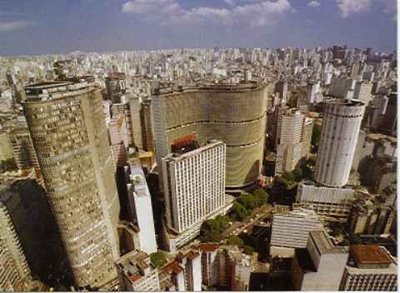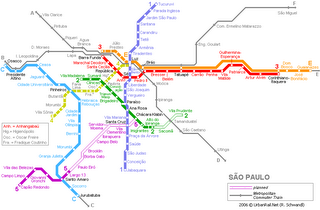First Impressions of Sao Paulo & Brazil


TO BEGIN, A BRIEF OVERVIEW & SOME FACTUAL INFORMATION:
Sao Paulo is very large. Ways of measuring the size of a city vary greatly, so I offer you these facts from Wikipedia:
"The city has an area of 1,523.0 square kilometres (588.0 sq. miles) and a population of approximately 10.9 million (2005 IBGE estimate), which makes it the largest and most populous city in the Southern Hemisphere. 19 million people live in the greater São Paulo metropolitan area, as defined by the government (Região Metropolitana), making it one of the five most populous in the world. Including adjacent metropolitan areas, there are nearly 29 million inhabitants, more than any other city in the world except Tokyo with 35 million. (source: IBGE)."
The city center doesn't seem to be where the nice parts are. It seems kind of dingy and dirty there, with congestion, narrow streets and street kids. The more vibrant and sophisticated areas are located in the west end of town. Avenida Paulista & Avenida 9 de Julho are two of the city's main axes, and the areas south and west of where they cross seem to be the most urban and chic (Consolacão, Bela Vista & Jardins are some names of those neighborhoods). The school I'm attending, Fundacão Getulio Vargas (GV), is right in this area.
I'm staying with my cousin Lisa, who lives in a mostly Jewish area called Higienopolis, also in the west end of town. Through New York probably tops it in terms of diversity, Sao Paulo is very ethnically diverse, with strong Portuguese, Italian, African, German, Jewish, Lebanese, Korean and Chinese communities (not an exhaustive list, to be sure). Most people seem to be a mix of more than one, and retain their separate identities while being Brazilian at the same time. There is certainly a strong sense of national identity here, with loads of Brazilian flagsa on t-shirts, sandals, hung on walls, etc. Besides, the US, I don't think I've ever been in a country so diverse, but its nice...kind of like home, but everyone seems happier and is way better looking, and the sense of nationalism doesn't freak you out as if a Nazi demonstration were about to occur.
THE WEATHER:
Here it's winter, coming onto spring, and it's been in the 80s (F) every day. Typical winter temperatures for this time of year are in the 60s, with a seasonal standard deviation of about 10 degrees. I'll be here until the height of summer, when it's supposed to be 90s and 100s all the time. It rains more in the warm months, and luckily it's been very sunny every day since I got here.
PORTUGUESE:
It's sort of a funny-sounding language, which I say with the utmost respect and affection. The Rs are like Hs, so Rio is pronounced Hee-Oh. Better still, is that they add a long E to the end of many works, and all foreign words seem to take this ending. For example, flat, iPod, and crowd, are all used in English done in Brazilian style, and are pronounced Flatchee, Ay-Pogee and crowdgee, respectively. I chuckle every time I hear one for the first time. But seriously, it's a very beautiful langauge, with soft sounds and a musical way of speaking, and many words have very rich meanings; that is, one word is used to mean lots of things..
I'm picking the language up quikly, but do need to enroll myself in a formal course in addition to reading and figuring things out on my own. From Spanish and knowledge of some other languages, I understand 90% if the speaker doesn't go too fast, and I can say most things with maybe 75% accuracy not counting the verb conjugations. I only learned present tense this summer, so getting at least one of the past tenses is urgent. It's coming along, though...I was pleased that I've been able to talk and get around by myself with relatively few frustrations since I got off the plane.
COST OF LIVING:
Brazil is cheap in some ways and extremely expensive in others. Eating locally produced food is cheap, and there is an abundance of amazing fruit, meats (churrasco), breads, and many local dishes that are delicious and, relative to US or European prices, very cheap. Oh, and of course coffee is inexpensive and quite good. Luckily, Brazilians eat very well.
Some global brands like Marlboro and Coca Cola are the same or cheaper because production is done regionally. However, electronics, mobile telephones and use of of them, foriegn clothing and basically any imported good is more expensive here, which blows your mind when you see how many people are buying those things. To give you an idea, the crappy phone I bought was about USD$100, and per minute I pay more than 50 cents, with text messages costing around 25cents. Granted, I'm on a pre-pay plan since I'm foreign an ineligible for invoicing, but still this is high. Everyone at school seems to have a $USD300 to 400 phone, but I can't justify paying so much for something I'm likely to break or lose. Sneakers are really expensive. Blah, blah, blah....you get the point.
BUREAUCRACY:
It's rampant here, which I expected. Many former colonies have vestigial, dead-wood branches and departments of their governments, which seem to serve no purpose other than to provide a few functionaries a job and make life miserable for everyone else. Senegal had lots of this, and Brazil, while leaps and bounds better (can't stress that enough) is no exception. As a foreigner, I've had to jump through so many hoops to enter the country with a visa and maintain a legal status, and the cost in actual payout has been at least USD$300, while the value of the time I've spent doing all these things places that figure much higher.
This should give you an idea:
Visa requirements:
- Two Visa Application Forms
- Passport (so far so good right?)
- A copy of a round-trip ticket or a booked itinerary showing travel to and from Brazil, confirming purchase of the ticket and passenger's name, itinerary, flight number and arrival/departure dates;
- two recent 2" x 2" passport-type photos, front view, white background. Snapshots or computer pictures are not accepted;
- proof of financial capability during stay in Brazil (i.e. certified copy of bank or credit card statement, copy of savings certificate, letter from the employer or institution that granted a scholarship, etc). The Consulate will then legalize the signature of the notary public. US$20.00 fee will be charged
- affidavit from the sponsoring Brazilian company or institution containing specific information on the activity to be performed, location and duration of the engagement. The letter must be legalized by a notary public in Brazil;
- police clearance issued within the last 3 months, certifying absence of criminal record. Police clearance must then be legalized by the Consulate. A fee of US$20.00 will be charged;
(For this last one I had to go to the NYC police station over lunch and wait for about an hour with a bunch of degenerates and pay like 40 dollars in a money order (another errand). I had to go again (another lunch wasted) two weeks later to pick it up.
- proof of residence within the consular jurisdiction for the past 12 months (i.e., letter from the employer/educational institution notarized, utility bill or voter's registration)......since I moved to DC for grad school 9 months before I had none of the easier things, so I had to get a copy of my voter registration from City, which took some calling around to be sure. I'm glad I vote.
IN ADDITION, I had to pay fees totalling USD$160 or $180 (can't remember), which could ONLY be payed in USPS money orders, but after going to get the first one for $150 I realized it would be more, but it wasn't clear how much more, so I had to make an extra trip to the post office over lunch (good times) to get a few extra money orders in 10 and 20 dollar denominations.
I had a two-hour window during which I could hand all this in, then I had to go back the next day during a different two-hour window to pick up my passport with the visa sticker in it.
THEN, once in Brazil, I had to:
- Have every page of my passport photocopied and then notarized, which was like $25 but required that I find a notary.
- Also I had to download two forms from the Internet, which without the school's help would have been impossible to figure out, then take them to a bank to pay additional fees (Banks in Brazil open at 10 and close at 4) for payment, and then get a receipt.
- Two more passport photos (the ones I took for my visa, which were fine in NY, were unacceptable here because they weren't the right size)
Then, take all this to a Federal Police station, wait in line to fill out another form, then hand it all in, then wait another hour for them to call my name, finger print me (they finger printed me for the criminal background check in NY, btw, but I digress) and give me this little piece of paper the size of an envelope flap with stamps and typing on it that I'm supposed to keep in my passport.
GETTING AROUND:
Taxis are not much cheaper than in NYC, so after a few days of cabbing it everywhere I had to figure out something more affordable. The buses and subway are cheap in price (about a dollar for either mode), but the buses are kind of hard to figure out at first, and the subway is very nice and clean and safe (lots of poice with big guns) but doesn't seem that well designed in the sense that it takes me 3 trains to get about a mile.
Well, these are my first impressions. More to come.
No comments:
Post a Comment